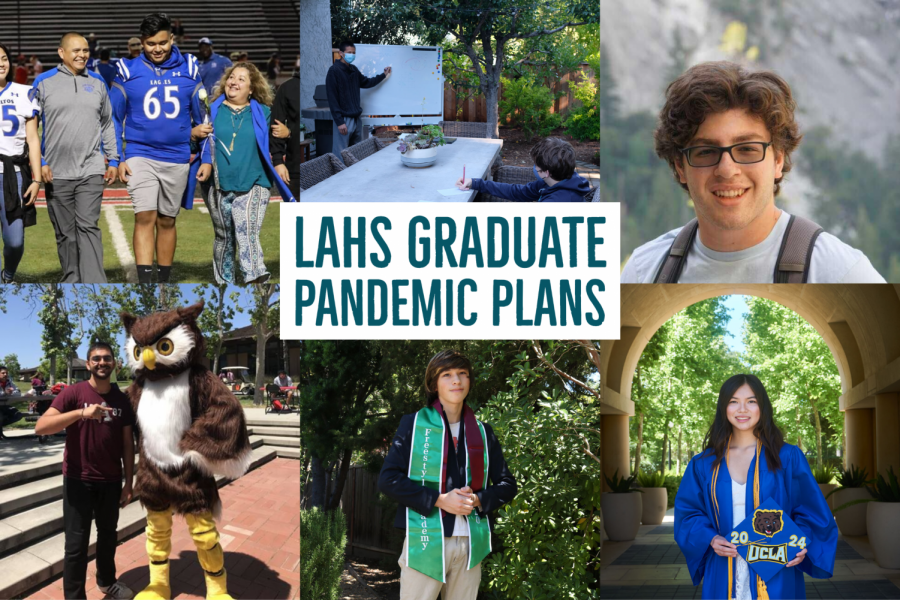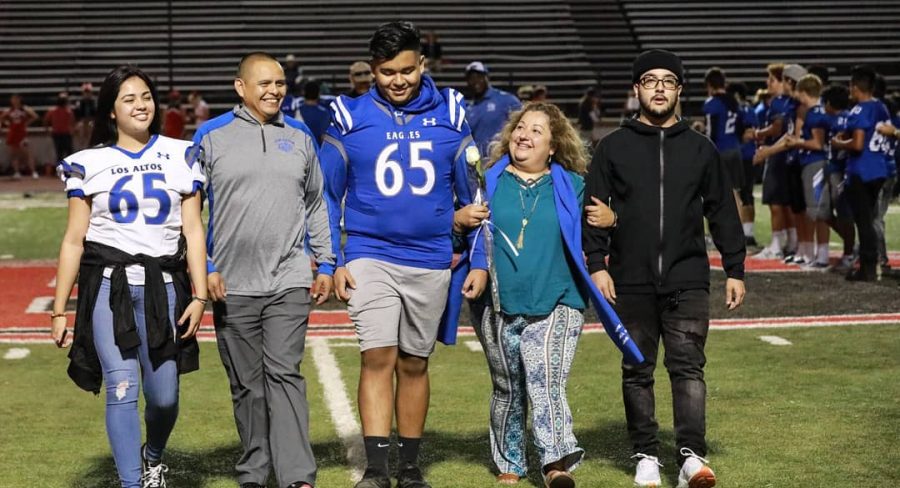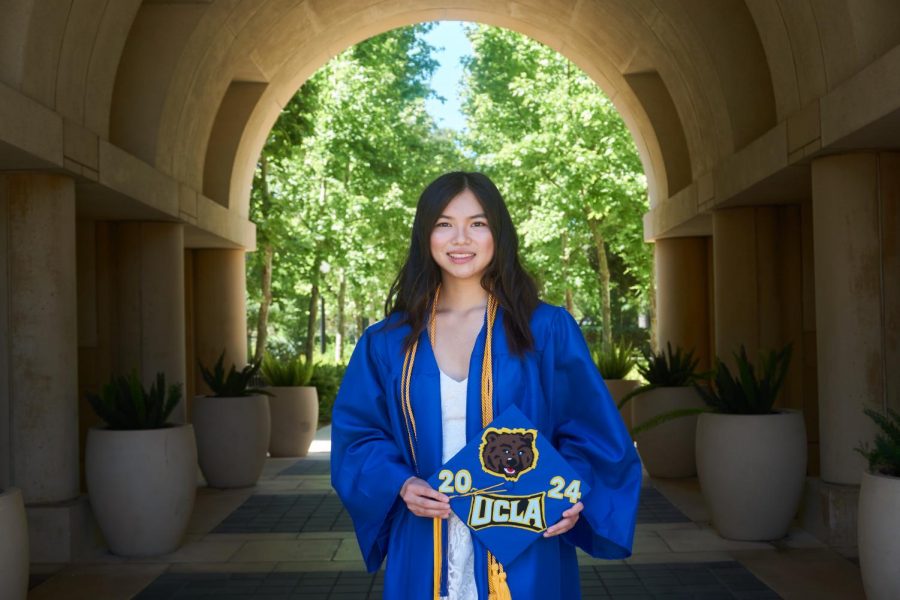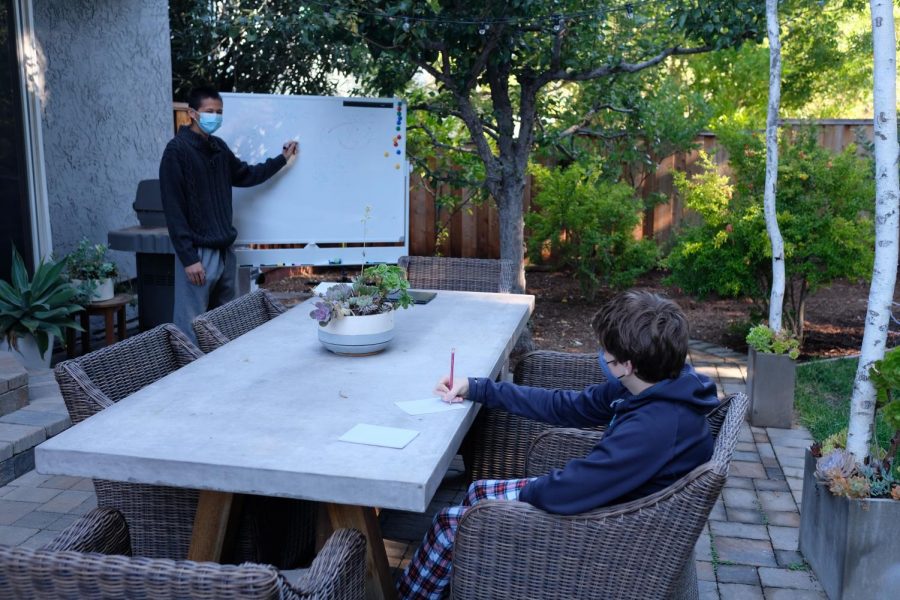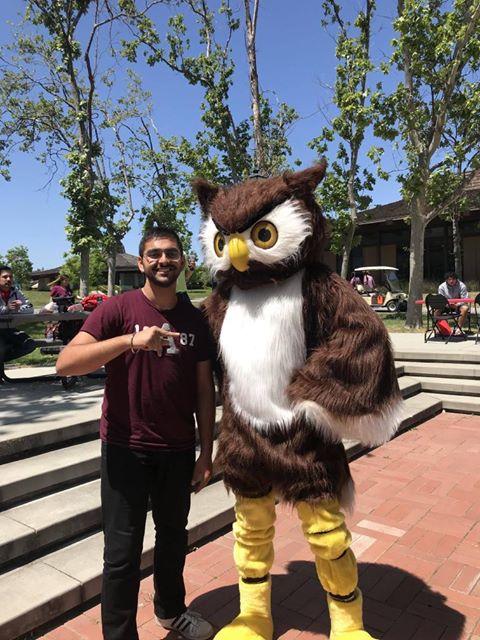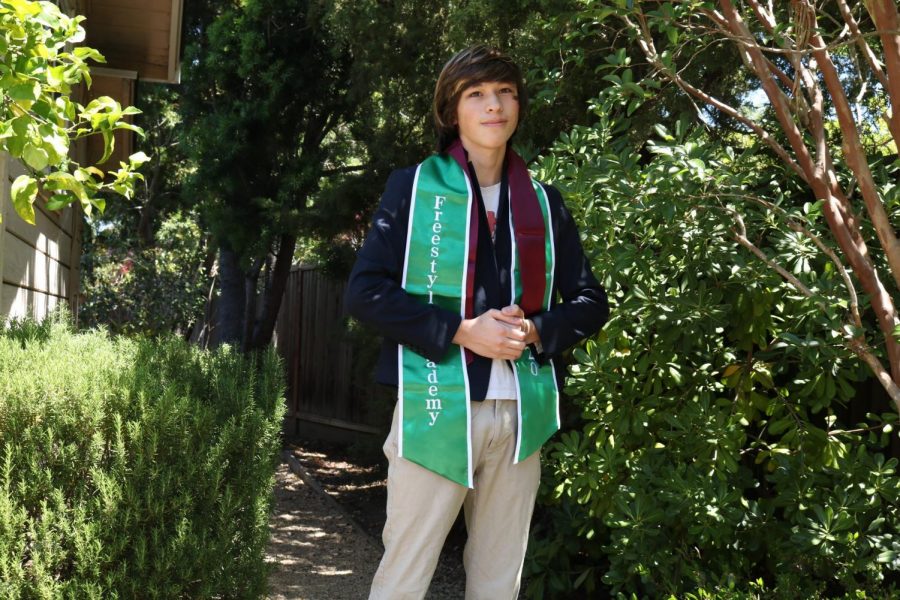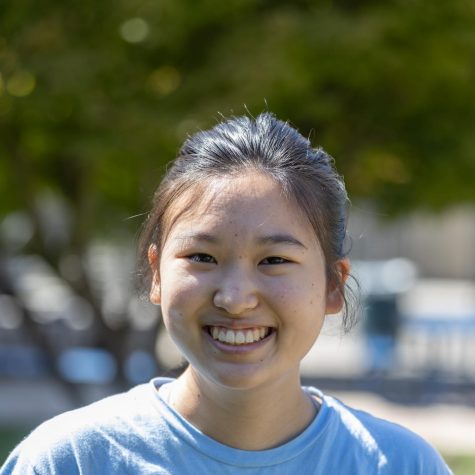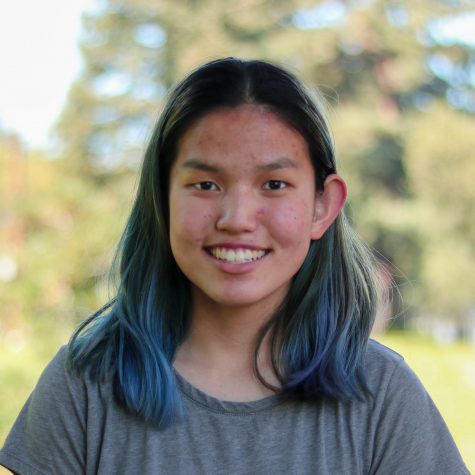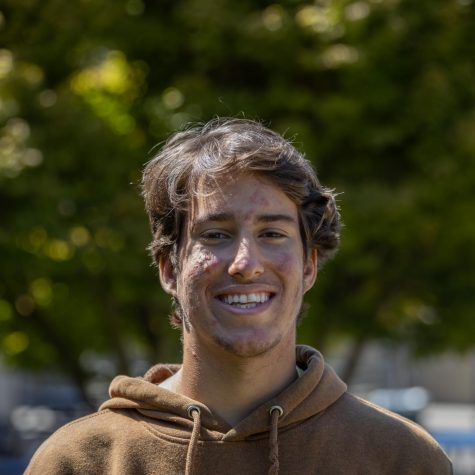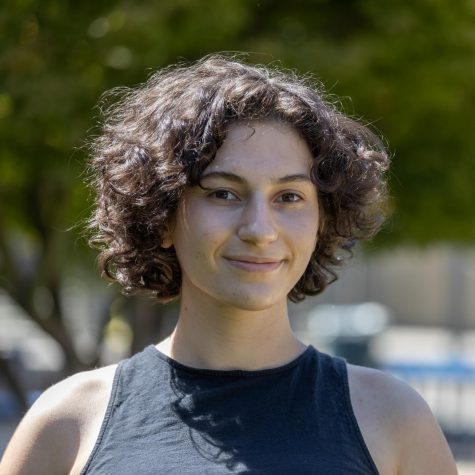The Talon interviewed several Los Altos High School graduates to give you a look into college life, distance learning edition. While some students are learning virtually, others have chosen to defer their first year. Continue reading to learn about how the pandemic has affected these graduates’ decisions.
Post-grad plans during a pandemic
November 8, 2020
Ben Rubinstein
Ben Rubinstein, ’20, currently resides over 7,000 miles from home, taking in the sights and culture of Israel during his COVID-19 inspired gap year. Upon his return, he hopes to pursue his dream of becoming an astronaut through an aerospace engineering major at Case Western Reserve University, successfully blurring the lines between spaceflight and spirituality.
Fifty years ago, astronaut Neil Armstrong became the first person to set foot on the moon, but since then, space exploration has halted. Mars has only been explored by unmanned spacecrafts, and human colonization there seems unlikely anytime soon. However, Ben Rubinstein, ’20, hopes to be a part of the team that pushes it forward.
Currently on a gap year, Rubinstein will attend Case Western Reserve University (CWRU) next fall and aims to pursue a five-year master’s degree in aerospace engineering. Afterward, he’s considering becoming an astronaut through the prestigious National Aeronautics and Space Administration’s (NASA) Astronaut Candidate Program.
Surprisingly enough, spaceflight was never a childhood dream for Rubinstein, and he only seriously considered the career path during his senior year. Combining his long-lived interests in engineering and computer science, he was drawn to the high-stakes task of solving complex problems on a spacecraft, often a matter of life and death.
But his greater motivation to pursue space travel came from wanting to be in a profession where he could use his passions for good and enact real change to inspire others. Space travel, Rubinstein said, was a way to do just that.
“Imagine being in a place where people can say: ‘This person gave something for their country,’” Rubinstein said. “We see the idea of someone on top of a rocket ship who’s willing to risk everything for exploration, and that’s what I want to take and channel into something positive.”
Unfortunately, Rubinstein’s space mission hasn’t taken flight yet. Due to the pandemic, Rubinstein made the choice to defer his college enrollment a mere two days before the deadline, citing that completing his freshman year remotely would take away from the typical social experience he hoped to find in college.
This school year now holds an unplanned chapter in Rubinstein’s life: He’s living 7,000 miles away from home in an apartment with four roommates through a gap year program called Aardvark Israel. The choice to move to Israel came naturally to Rubinstein due to his fluency in Hebrew and the instant connection he made with the country’s rich culture upon his previous visits.
The 10-month program began in September with participants spending the semester either in Jerusalem and Tel Aviv. Typically, students spend the year going on hikes and visiting unique Israeli settlements like a kibbutz, an agriculture-based collective community. This year, however, Israel faced several country-wide lockdowns, forcing them to stay inside for much of the time and order Doordash and Amazon Prime for basic supplies.
Rubinstein, like any successful astronaut, adapted quickly to these challenges and was still able to explore much of the nearby communities through volunteer work. He’s also thankful for the program because he’s had the chance to escape the pressures of academia and more importantly, meet diverse peers from across the world.
“There are some really good people here — intelligent, kind and loving people,” Rubinstein said. “My peers are coming from inner city Chicago or from Atlanta, Georgia, and have widely different political and social beliefs. Being able to hear their stories and getting to know them on a personal level is very valuable to me.”
Rubinstein may not be currently studying aerospace engineering at CWRU, but he has jumped at opportunities and has been able to gain real-world experience in the STEM fields. As a software developer intern at a local Israeli travel startup called Bridgify, he is currently working on the company’s backend and later with their artificial intelligence machine.
“It’s very cool to tackle these huge coding problems that I learned about at school but was never able to actually implement,” Rubinstein said. “I’m constantly having to prove myself and I’m totally out of my depth, but at the same time I’m learning something new every day.”
Though the program is largely secular, religious studies are offered. This semester, Rubinstein is taking a course on Kabbalah, or Jewish mysticism. His studies involve deeply exploring the divine providence — G-d’s intervention in the universe — and examining ancient Jewish texts to better understand it.
Rubinstein has also dedicated time to follow certain religious Jewish customs, discovering what works best for him along the way. On the holiday of Shabbat, a time of rest every week from Friday night to Saturday night, Rubinstein likes to cook kosher food and avoid using his phone or public transportation in an effort to be more present with those around him.
“It’s nice to be able to go out on a two-hour walk at night with a couple of guys, get lost and actually have to figure out your way back because you literally don’t have your phones on you,” Rubinstein said.
While spaceflight and spirituality don’t always go hand in hand, Rubinstein feels that exploring his Jewish identity is a significant experience to him nevertheless.
“Whether I decide that I want to pray every day in college or never want to touch a Siddur [Jewish prayer book] again, being able to actually understand why the customs exist is so fascinating,” Rubinstein said.
Despite the pandemic, Rubinstein is keeping himself occupied and inquisitive, something that will prove helpful when he’s potentially up in space one day. But until then, he’s still exploring what life has to offer on the ground.
“We’ll see, maybe I’ll decide in 20 years that I want to go into politics or teaching,” Rubinstein said. “I know that I have to have a direction, but the fact that I don’t know exactly what that direction is now doesn’t scare me — I’m excited about it.”
Miguel Orozco
Miguel Orozco, ’20, (third from the left) is pictured walking down the Foothill College football field with his family during the 2019 LAHS Homecoming game. Orozco is starting his freshman year at Foothill College virtually this fall to complete EMT training in hopes of becoming a firefighter in the future.
Most kids dream of becoming superheroes, but few of them actually put in the effort — radioactive spiders are hard to come by.
That’s not the case for Miguel Orozco, ’20, an incoming freshman at Foothill College who’s living out a lifelong dream. Orozco aims to be a firefighter and someday, a fire chief.
“As a kid, my favorite superhero was definitely Spiderman,” Orozco said. “He’s an average kid who gets powers, but instead of showing them off to his classmates as any teen would, he hides them so he can protect his neighborhood. I really admire that.”
While four-year colleges initially piqued Orozco’s interest, he decided on Foothill instead of immediately pursuing an advanced degree; as someone who wasn’t completely sure of his major, he felt that Foothill would allow him to cultivate his interests without being a financial strain on his family.
Orozco has taken his favorite superhero’s mantra to heart: With great power comes great responsibility. Currently pursuing an Emergency Medical Technicians (EMT) certification and an associate’s degree in civil engineering, Orozco plans to transfer to a four-year university. Once transferred, he’ll complete not only a bachelor’s degree in fire protection engineering, but also a bachelor’s degree in paramedic science.
However, the extended shelter-in-place policies threw a wrench into his plan — Orozco’s fall semester is now completely virtual. His EMT certification, which is typically lab-heavy, adjusted its curriculum in accordance with distance learning. Some in-person labs were replaced with internships on local ambulances for hands-on experience, though these opportunities won’t be offered until the spring semester at the earliest.
“While I thought college life would be different, I didn’t think it would be different to this extent,” Orozco said. “I was excited to meet people who I hadn’t just gone to school with for the past four years, people from all walks of life.”
This year’s new student orientation was an underwhelming, four-hour-long Zoom meeting, a far cry from the typical campus tour and demonstrations.
“It honestly didn’t even feel like an orientation, just an informational video,” Orozco said. “None of the students interacted with each other — it was just the speakers talking for hours.”
Orozco, like any good superhero, has been able to roll with any punches distance learning throws at him. He remains excited to attend school events and connect with the Foothill community once guidelines relax.
“Meeting new people is definitely harder, but still doable,” Orozco said. “In my math class, some other students and I gave each other our numbers and created a study group. But for other classes like English, almost all of our work is independent, so trying to connect with others is difficult.”
Even with the limitation of distance learning, Orozco remains determined to pursue his childhood dreams — not having flashy superpowers or fighting supervillains, but helping out the community to the best of his ability.
“Of course, superheroes aren’t real,” Orozco said. “But by helping others, I can get as close as I can to actually being one.”
Alyssa Hamamoto
Alyssa Hamamoto, ’20, donned in her graduation gear, is holding her University of California Los Angeles (UCLA) themed cap. Hamamoto, an incoming freshman at UCLA, is taking her courses from home to be close to her family and hopes to major in political science due to her passion for history and political theory.
Even though Alyssa Hamamoto, ’20, felt certain she wanted to attend a University of California, or at least a school in California, she felt bittersweet receiving her letters of acceptance because she was unable to celebrate them with her fellow classmates and friends. Similar to other graduates, Hamamoto felt like the year ended on an odd note once school shut down.
“It was a little strange,” Hamamoto said. “We were getting our acceptances or rejections. At school, we got the chance to talk to our friends about our experiences in person. But when everything closed, it was strange to be opening them on my own and not knowing how everyone else was doing.”
Hamamoto chose to attend the University of California, Los Angeles, and having had two older sisters who attended colleges in California, she remembered how easy it was to visit them. She also took into consideration the affordability of tuition and the courses offered at UCLA.
“I really liked the infrastructure and the academics at UCLA,” Hamamoto said. “I also wanted a bigger city vibe because Los Altos is kind of small and less busy. I thought it would be a good change.”
In high school, Hamamoto found that she was drawn to history, particularly the stories and lessons she can learn from it, and now plans on pursuing a political science major at UCLA. She found a career in government less limiting than in history and appreciated that it would allow her to make an impact on the future.
“I enjoyed my high school history classes and learning about how history shaped the decisions that people made in the past,” Hamamoto said. “Political theory combined those interests, which made me decide to pursue political science. I like how there are so many areas that I can pursue in law, and while I haven’t fully decided on this path yet, it is something that I am very interested in. ”
Despite not getting to meet other students within her major in person, Hamamoto was able to interact with fellow freshmen at orientation virtually. There, she was grouped with others in the same major as her and heard their perspectives on education during the pandemic. Nevertheless, Hamamoto recognized that she, like many of her peers, missed out on an important part of the college experience.
“It’s kind of sad when you think about it,” Hamamoto said. “This is the time where a lot of people would be making new friends and growing up.”
Hamamoto, along with other incoming freshmen, was originally assigned a dorm in mid-July, but her plans changed due to Los Angeles regulations. She currently resides at home until restrictions are lifted. Despite orientation and email updates, not much in-depth information was shared about the upcoming school year, leaving students with unanswered questions.
“I wish they would be more transparent, but I think that the school staff also doesn’t know much about what is going on,” Hamamoto said. “I think they’re doing a pretty good job and have been compliant with all the regulations in each area.”
For Hamamoto, the issue does not so much lie with how the school is reacting to the pandemic but how Los Angeles residents are reacting to it.
“The Los Angeles County has been strict with reopening plans and releasing guidelines that can help control the coronavirus,” Hamamoto said. “The main problem is that many ignore these policies, which has led to continual increases in COVID-19 cases.”
Instruction began on Thursday, October 1, allowing students to get their first taste of distance learning. Hamamoto has had a smooth transition into virtual classes with no major technical difficulties.
“The Zooms can be pretty monotonous at times but I can tell that my professors are also trying their best to transition to online learning and make things as engaging as possible,” Hamamoto said.
Alex Guh-Siesel
Alex Guh-Siesel, ’20, is pictured tutoring a student while socially distancing through his growing STEM tutoring program Crimson Guaranteed. After his acceptance into Harvard for this fall, Guh-Siesel ultimately decided to take a gap year during which he plans to add more lab skills to his repertoire and continue exploring his passions.
Whether it be through scientific research or peer tutoring, Alex Guh-Siesel, ’20, loves to share his insights with those in his community. At Harvard University, Guh-Siesel hoped to do the same while diving deep into his passions for science and education, including the continuation of his year-long treatment research for celiac disease.
However, his plans took a sharp turn due to the pandemic; he, like many others, never imagined it would have such a devastating impact. Initially envisioning himself still attending campus this fall, he hesitated to defer.
“By taking a gap year, there would be an influx of students next year matriculating as freshmen,” Guh-Siesel said. “Harvard would not be able to guarantee on-campus housing if we deferred.”
After talking with several Harvard graduates, however, Guh-Siesel chose to defer. He realized the value of social, in-person learning and decided he didn’t want to forgo that college experience his freshman year. On campus, he would have to undergo lengthy safety restrictions, including limited interactions with students and staff, testing twice a week and an ultimately sequestered dorm experience.
“I’ve accepted it and tried to make the best out of my situation,” Guh-Siesel said. “There’s that old adage: ‘When life gives you lemons, make lemonade.’ I’ve tried to implement that into my COVID routine and life, and I think I’ve been pretty successful.”
One of Guh-Siesel’s early fears at the beginning of his gap year was finding ways to stay busy, but to his surprise, it’s been quite the opposite — in fact, he’s been overwhelmed with his workload.
The bulk of his schedule includes expanding his tutoring service, Crimson Guaranteed, in which he helps elementary and middle school students with STEM topics either over Zoom or in-person in a socially distanced environment. Additionally, he assists upperclassmen in the college application process and plans to volunteer with Los Altos High School’s AVID program.
As a student majoring in chemistry, Guh-Siesel has also used this opportunity to expand his scientific horizons and learn computational biology. He is continuing to work at the Stanford Calvin Kuo Laboratory — the same place he conducted his celiac disease treatment research last year.
“It’s been a really fun and exciting process for me because I’m pretty new to coding and computer science,” Guh-Siesel said. “A lot of analysis and data can get lost in communication that can really hinder research and the scientific process, so having broad knowledge in a few different fields is something that will be helpful.”
Guh-Siesel is learning how to perform RNA single cell sequencing analysis and aims to eventually become proficient in the statistical computing language R. The learning curve has been demanding at times but is just as exciting for him.
After completing the college application process last year, Guh-Siesel has also had the chance to reflect on his high school journey and determine what he wants to achieve in life. Being half-Chinese but unable to speak the language fluently, he decided that one of his personal goals would be to learn Mandarin and is now taking a Foothill College Mandarin course.
“I thought the college application process, albeit confusing at times, was really an eye-opening experience for me,” Guh-Siesel said. “I learned more about myself and where my interests and passions lie.”
Despite his tight schedule, Guh-Siesel has found time to meet up in-person with fellow Harvard “gappers” he’s been introduced to through word of mouth and social media.
“It’s been great to form these connections now so that we’ll all know each other starting next fall,” Guh-Siesel said. “It’s also helped me stay socially connected with others during the pandemic.”
As for fall 2021, Guh-Siesel looks forward to interacting with other students across various fields on the Harvard campus. Having been a highly-involved student at LAHS, he can’t wait to explore the expansive array of extracurriculars Harvard has to offer.
But until then, Guh-Siesel will carry on with his gap year — and make lemonade.
Gurshaan Arora
Gurshaan Arora, ’19, is pictured posing with Footsie the Owl, the Foothill College mascot. Arora is in his sophomore year at Foothill College and maintains a positive outlook on distance learning as he looks to transfer into UC Davis’s pre-med program next fall.
With distance learning lasting through the semester, students have begrudgingly adapted to the sedentary lifestyle of working from home. But as other students gripe and groan, Gurshaan “Gursh” Arora, ’19, doesn’t cry over spilled milk.
“I wasn’t sure how long shelter-in-place would last — but after a month of seeing how serious the situation was, I realized precautions would probably last for the rest of the year,” Gursh said.
Gursh decided on Foothill College as the affordable option for his family: The school offers free tuition and books to all students for their first two years. Another enticing factor was Foothill’s Transfer Admission Guarantee Program, which allows students a guaranteed transfer to most Universities of California (UCs) if they complete requirements according to their major.
“I knew that I’d be doing my undergrad classes regardless of where I went, so Foothill was the smarter option for me,” Gursh said. “It was a huge confidence boost knowing that I wouldn’t be behind my university-going peers in terms of progress, but would be doing the exact same classes for free.”
Gursh is currently majoring in biology and hopes to transfer to UC Davis’s pre-med program next fall to pursue a career in medicine.
Gursh has experienced Foothill both on and off campus, and although he prefers in-person learning and misses the social aspect, distance learning hasn’t been all bad for the rising sophomore. He sees the benefits of a remote education and hopes to encourage other students to recognize them as well.
“My family moved to Gilroy after my senior year of high school, so I used to have to commute an hour to Foothill — more during traffic,” Gursh said. “Now, I get the benefit of more time, not having to wake up early to beat traffic and saving gas!”
Gursh’s major was especially affected by distance learning due to the lack of in-person labs. Always the optimist, Gursh does not lament the loss but instead appreciates Foothill professors for replicating the in-person experience.
“I think there’s a lot of stress with in-person labs — constantly needing to make sure you’re doing everything according to procedure,” Gursh said. “In an online format, everything is rather simplified.”
Distance learning has taken on an unexpected role in Gursh’s life by becoming his muse. As an aspiring musician, he was inspired to create an original song in April of this year: “Zoom!” Instead of focusing solely on the downsides of shelter-in-place, Gursh finds silver linings by celebrating the community’s efforts to stop the spread of the virus. The song’s uplifting message ensured its victory in the Foothill COVID-19 Public Service Announcement (PSA) Contest.
“I wrote ‘Zoom!’ to help everyone stay positive by highlighting the brighter side of things,” Gursh said. “My intention is to establish a positive viewpoint toward online learning while providing information about the tools that will help us all get through this quarter.”
Even under the grave circumstances of a pandemic, Gursh believes in the ability of his community to “Zoom through it” together.
Sean Li
Sean Li, ’20, is posing with his Freestyle Academy of Communication Arts & Technology banner upon high school graduation. Li starts at the University of California, Santa Cruz as a freshman this fall and is excited to begin his path into engineering off-campus.
In November of his senior year, Sean Li, ’20, only applied to two universities: University of California, Santa Cruz (UC Santa Cruz) and University of California, Santa Barbara. He based this unconventional decision on his extensive research about its student community, campus and academic programs. Aside from the educational opportunities, he was drawn to UC Santa Cruz’s small size and its emphasis on the campus’s natural surroundings.
Li has decided to attend UC Santa Cruz’s Jack Baskin School of Engineering to pursue an electrical engineering major. His passion for electrical engineering first developed when he received advice from his grandfather, a retired civil engineer, about the different engineering fields. After attending a robotics summer camp at Foothill College as a rising senior, he solidified his interest in the topic.
“The camp got me very invested in engineering because I got the chance to code a machine to do a certain task such as lighting up an LED light, increasing and decreasing volume or spelling a message,” Li said. “These projects focused on two of my favorite things: working with my hands and problem-solving.”
With his passion in mind, Li was excited to dive right into studying the subject and developing his expertise. UC Santa Cruz offers incoming freshmen the option to take a gap year, yet Li opted to begin his university experience this fall even if it was ultimately from home.
“I can understand taking gap years; it makes sense, especially during these times,” Li said. “It didn’t make sense in my case since I feel confident enough about what I’m doing and what I’m getting into.”
UC Santa Cruz also gave students the option to reside in the dorms on campus where they would have to attend class virtually.
“I was on the fence, but I decided not to go because I’d rather be close to my family,” Li said. “If I’m not going to be in classes, I’d rather be here in someplace I’m comfortable. I’m close to my friends and a place that I know.”
He hopes that given the university’s small size, it will make transitioning back to in-person learning much easier with fewer students to account for. Based on a number of informative emails he’s received from the administration and his virtual orientation, Li believes that the university is handling COVID-19 well.
“In terms of the campus and classes, UC Santa Cruz is working to make sure that there’s a very small risk of actually contracting the coronavirus and being sick because they do want people to come back, but they also prioritize the students’ health,” Li said.
Since starting his classes on Thursday, October 1, Li has experienced the challenges of attending university virtually. While he’s now adapted to new educational platforms such as Canvas, Li initially found it challenging to navigate the various sites and instructions that came with each class. An additional downside he found to distance learning is the lack of human interaction that is usually expected in classes.
“It’s unfortunate that we have to use these formats because they’re very inefficient at fostering relationships,” Li said. “A person’s tone and personality are completely lost over text discussions, and people barely speak when they have to. You don’t really get to make connections with anyone.”
Despite a rocky and somewhat isolating start to the school year at home, Li continues to see university as a good opportunity to get invested in the community and begin building his future.
“I am really looking forward to being on campus, having great experiences, being more independent and making more connections when the time comes,” Li said.


